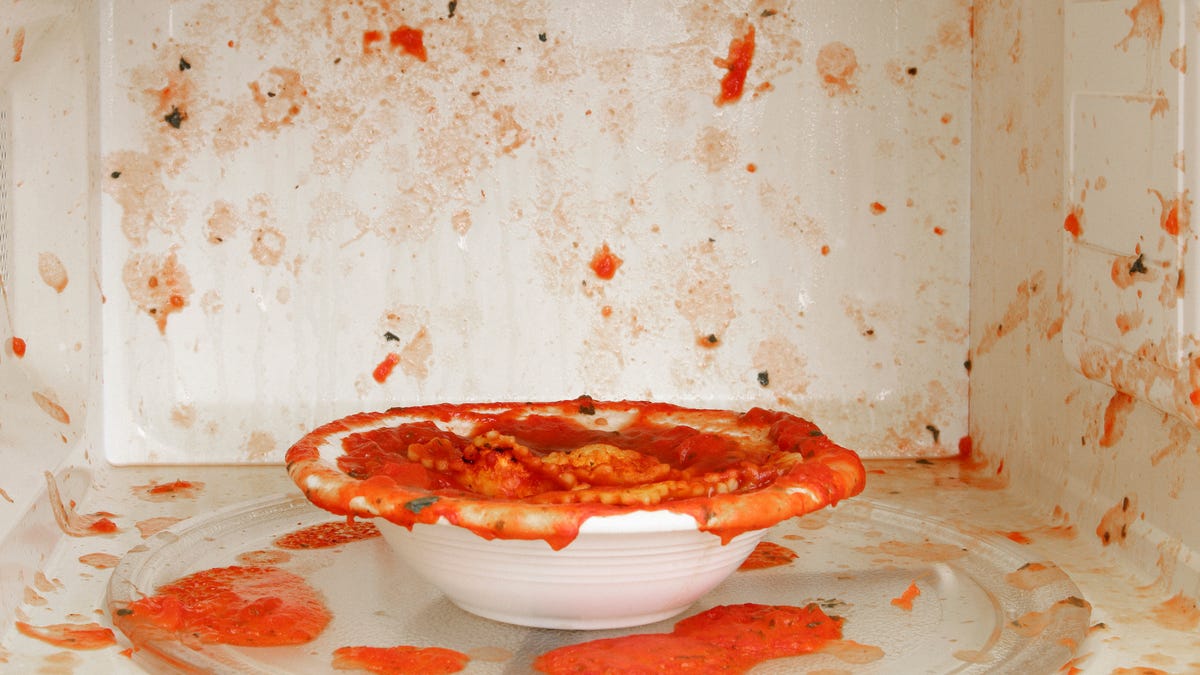 Why You Can Trust CNET
Why You Can Trust CNET Stop Your Food From Exploding in the Microwave. Here's How
Yes, that tomato sauce will splatter everywhere. Here's why it happens and how to prevent it.

It's always the pasta sauce.
I'm not a massive fan of reheating food in the microwave -- there are several superior ways to reheat most food -- but I'm not totally against it either. That's especially true for popcorn and small amounts of liquid, like tea that's gone cold, or a few ounces of leftover marinara to lend some panache to an eggplant sandwich. But certain foods tend to explode almost without fail whenever nuked, leaving an annoying extra cleaning step that all but voids the time-saving nature of the small appliance.
There's a reason why some foods including tomato sauce are more likely to explode in the microwave, and it has a lot to do with famous arch nemeses: oil and water. There are also easy ways to prevent making a tomato-based Jackson Pollock in your Panasonic. (And if you're wondering, there are some things that should never go in the microwave.)
For more helpful tips in the kitchen, check out these nine cooking hacks that actually work and learn how to protect yourself from leaky gas stove.
What makes food explode in the microwave?
You've probably noticed that some foods pop, burst and explode more than others in the microwave. This can ultimately be attributed to the presence of water along with the food's level of viscosity and density. Items with less consistent texture tend to trap pockets of water that get encased by denser molecular structures, like say, chunks of tomato. When the watery bits heat up, they turn into angry little storms of steam that need somewhere to go. If those steam molecules run into resistance in the form of sauce with higher viscosity and are heated enough, eventually they'll overpower the cooler insoluble parts. Boom goes the bolognese.
Nonporous foods with an outer skin and internal moisture -- apples, sausages, potatoes, squash -- are also prone to explosion since steam will build up under the outer layer with nowhere to go.
But back to pasta sauce for a minute. Counterintuitive as it may seem, fat and oil are actually bad conductors of electromagnetic radiation. Pockets of fat or oil heat up more slowly than foods with water content in a microwave, creating inconsistency and a higher likelihood of combustion. Tomato sauce typically has a healthy amount of oil, which is one reason for its outsized volatility. Tomato sauces with particularly high doses of olive content like delicious Rao's, are likelier still to explode after just a mere few seconds of action.
Foods with a uniform consistency are less prone to explosion
Popcorn explosions in the microwave are typically a good thing but most other foods just make a mess.
If you've ever microwaved water, consommé or a cup of tea, you probably encountered very little, if any, popping and bursting. That's because those thinner liquids have a nearly uniform consistency, so there isn't much friction when the molecules start to energize and move about. Steam is released from the surface with ease.
Pureed soups, sauces and other liquids tend to have less viscosity which makes them less likely to end up on the walls of your microwave. But even smoother sauces have enough molecular inconsistency that they'll burst eventually, often before the portion is entirely heated through.
Most solid foods just pop and crackle in the microwave, but they can burst, too. Much like soups and sauces, foods with pockets of air or water under the surface can create steam bubbles and explode. Stringy meats -- corned beef, slow-cooked short ribs -- are more likely to do so than denser foods such as steak or a skinless piece of grilled chicken. Foods with skin such as apples, sausages, skin-on chicken and fish are also prone to explosion since pockets can form between the skin and meat. (Just in case you needed another reason not to put salmon in the microwave.)
If you've got consistent explosions in your microwaves, you might consider a lower heat setting.
How to prevent messy microwave explosions
For liquids and semisolids, your best defense is stopping and stirring every few seconds to neutralize the pockets before the pressure gets so great that they burst. You may also try a lower temperature setting which will heat the food slower and reduce the risk of detonation. Lou Nieves, senior product engineer for Panasonic appliances, suggests 60% (or P6) power for most foods, 70% (P7) power for denser foods and crank it up to 90% (P9) for true liquids such as water, broth, coffee and tea.
For most non-porous solid food, try making vents with a knife or slicing the food into smaller pieces allowing steam to flow freely. Again, most solid foods do better with these non-microwave forms of reheating that will net more even heating with little risk of eruption.
A food cover for the microwave will save you some grief later on.
Until you master the nuances of your microwave's power settings, the best defense against a microwave mess is to cover your food. It will take the microwave longer to heat but it's so worth it. Plastic wrap or a paper towel will do the job. Even better is one of these glass domes or $10 plastic covers with vents that allow the waves through to do their thing and still protect against splatter, sputters and explosions.

